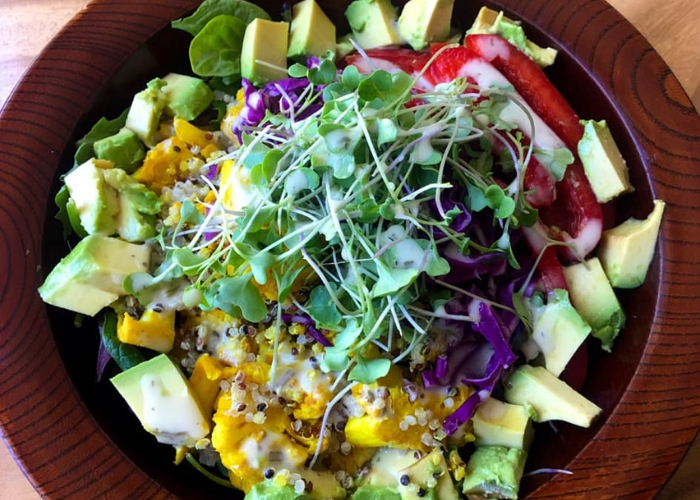When it comes to nutrition, the milk debate is probably as confusing and controversial as it gets. Is cow’s milk a cancer fighting, PMS subduing, osteoporosis preventing super food? Or is it just another multi-billion dollar industry working with the government to alter dietary guidelines in their favor?
On one side we’ve got the dairy industry, the federal government, and the power of conventional wisdom, and on the other stands vegetarians and a growing group of top nutritionists from Harvard and Cornell. Scientists are torn on whether milk is actually as beneficial as it’s marketed and how much we should or shouldn’t drink. The bloodbath over milk continues to thrive, but in the mean time what the heck are we as consumers (and health nuts) supposed to do?
Below are my simple suggestions and thoughts on dairy. Today we tend to look to scientific evidence to tell us what and how much to eat. But, what happened to paying attention to how you personally feel after eating certain products? Tuning into the internal workings of your own body will give you some clues into how to moderate or in some cases eliminate dairy from your diet.

The Facts On Milk: In most individuals milk causes gassiness and in some an excess of mucus in the nose and throat. This is why it’s commonly suggested to stop eating dairy if you have a cold. Holistic medicines like Traditional Chinese Medicine perceive milk as a damp substance that slows digestion. Ever felt like a clogged hose after downing a tub of Ben and Jerry’s or cheese plate? That’s your stomach having a difficult time digesting. Sensitivity and allergies from milk are more subtle and a lot more common than lactose intolerance.
It all depends on your body.
It all depends on your body.
Some people have no problem assimilating milk while others are completely unaware of how great they could feel if they cut it out.Beyond how you feel, do you know what’s laced in your milk? Growth hormones, antibiotics, and pesticides. Not to mention the ethical treatment of the cows themselves. But, that’s a whole other issue. And although a glass of milk does contain 8 grams of protein, it also contains 12 grams of the sort of carbohydrate that rapidly breaks down into sugar in the body.
My Suggestion:Cut milk out of your diet for a week or two and see how you feel. There are many amazing alternatives out there including: almond, soy, hemp or rice milk. So tasty! Give em’ a whirl and then decide if you really can’t live without a huge glass of cow’s milk every night. If you decide to stick with cow’s milk go for a certified organic brand or farm. The cows are fed organic feed (or better yet… grass fed) and not injected with hormones and antibiotics.

The Facts On Cheese: Hard cheeses cause excess mucus production and can exacerbate yeast infections since they are naturally high in mold. Cheese is basically a fat with a little bit of protein, so nutritionally speaking it should be eaten in moderation.
My Suggestion: The best cheeses for you are organic cottage and ricotta cheese, goat cheese, feta, sheep’s milk, buffalo-milk and any raw, unpasteurized cheeses. Goat, sheep and buffalo milk cheeses are usually better tolerated in people who have allergies to cow’s milk. The pasteurization process makes it very difficult for calcium to be absorbed, so grab the unprocessed brands.

The Facts On Yogurt:Rich in probiotics (the friendly bacteria) which add to and aide in keeping the four pounds of beneficial bacteria in the adult human intestinal tract in balance. It’s low in lactose making it much easier to digest than milk or cheese.
My Suggestion: Buy plain organic brands and sweeten it yourself with agave syrup, honey or fresh fruit. Creating a treat that is much lower in sugar than processed fruit yogurt. I usually buy organic goat’s milk yogurt because it’s even easier to digest. If you want to keep dairy products in your life than stock up on yogurt! Delicious.
Final Thought: Experimentation is key! I went several months without eating any dairy products and discovered I felt amazing without it. I even lost weight! Before my experiment I was drinking milk in my cereal and coffee, having cottage cheese and string cheese for snacks, and enjoying a slice of cheese pizza once in a while. After those few months the first time I had a piece of pizza I was sick for an entire day! Now I add splashes of soy or almond milk to my coffee and cereal and stick to goat cheese if I’m scoping a cheese dish.
How do you feel about dairy? Is it a huge part of your daily intake or have you fallen in love with hemp milk? I’d love to hear what works for you.
Resources:
Eat, Drink And Be Gorgeous by Esther Blum- MS, RD, CDN, CNS
Healing With Whole Foods by Paul Pitchford
The Diary Debate– LA Times
Resources:
Eat, Drink And Be Gorgeous by Esther Blum- MS, RD, CDN, CNS
Healing With Whole Foods by Paul Pitchford
The Diary Debate– LA Times






